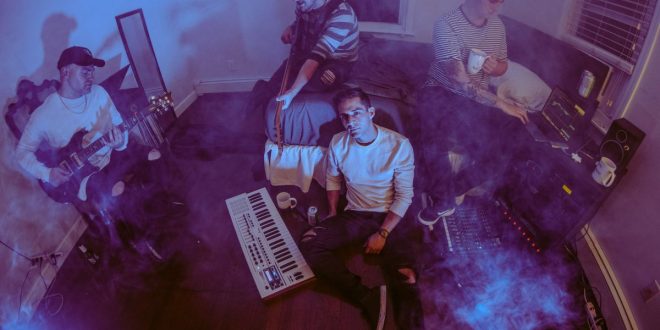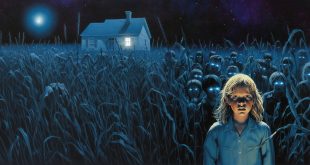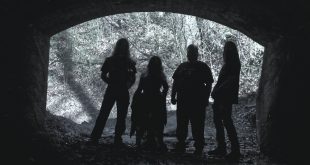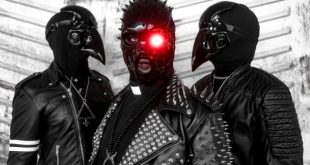Roderik is an emerging Long Island, New York-based band. Its lineup is catalyzed by frontman Jake Salazar and guitarist Jay T. Sutherland – both members of the critically-acclaimed Approaching Troy – and rounded out with bassist David P.K. and drummer Danny Nugent. The quartet, bonded friends who are known individually for their extensive experience in the city’s music scene, earns another distinction for having come together amid the Covid-19 pandemic. They have recently released their debut single, “Save Me,” a solid introduction to the band’s approach, which combines cinematic post-hardcore textures with Salazar’s brutally honest anecdotes involving battles with anxiety and depression.
I caught up with Salazar to discuss his days in the Long Island scene, the significance of Roderik’s formation and “Save Me,” as well as what the band has planned for future releases.
You’ve been involved in many different bands in Long Island since you were a kid. Can you tell me a bit about how the scene was, and how it has evolved?
Oh, man. So, I’ve been performing in the scene since I was about 12, and for quite a while, we were pretty much pay-to-play, which a lot of local artists were against (laughs). But it was very harmonious. There have always been bands who support each other, and you make a lot of friends. It’s a big community in a small area, if that makes sense. It was a lot more diverse back then, and kind of had its niche in pop punk. But what’s changed quite a bit is that many different artists in other genres don’t get as much love as they used to.
Even with its challenges, the dynamic between bands seems to be based on learning from one another, rather than competition.
Yeah, exactly. It’s competitive, but more like a healthy, fun kind of competitive. At the same time, it’s supportive. It’s like, “How do I achieve what I want to achieve, and then teach my friends how to get there too?” That’s what it’s like – “I’m gonna do this, but I’m also gonna show you how to do this.” It’s something that I think is very healthy in a scene.
How was your formative time playing in bands, and the eventual transition to Roderik?
Back then, I was in the band Approaching Troy, and we did okay. We toured the country and played a lot of regional shows. We played Gramercy Theater – we did some really cool things. But you know, every artist comes to that point where they ask themselves, “Shouldn’t we start something new? Has this journey kind of run its course at this point?” That’s how I started feeling about Approaching Troy; it just felt like it had come to a close. Musically, I wanted to at least do something a little different, and that’s basically how Roderik got its start. I also can’t explain how we formed without also mentioning how the pandemic played into that. As an artist, you don’t know what your next task is or should be, but as far as where I wanted to go with my career, that was actually made clear to me by the pandemic. I’ll never call the pandemic a good thing, but it was beneficial for me in realizing that.
In a way, it pushed you back into your creative space.
Right, exactly. That’s a lot of time an artist wouldn’t normally have, because they’re always working toward the next thing. But this allowed me to slow down focus on what could realistically come next, and also how I wanted to create, and what exactly I was going to build from here on.
Going further into your creativity, your band name is inspired by Edgar Allan Poe’s The Fall of the House of Usher. What is it about the story, or about Poe himself, that inspires you as a lyricist?
It’s based on what we experience as people. We come from very dark paths, all of us. I’m not saying my upbringing was bad or anything; I have a great family. But we all seem to have our inner demons. I’ve always felt like there was something beautiful about the darker side of imagery, poetry, and music. There’s something to be said about dark emotions when it comes to feeling strongly about something, and I don’t necessarily mean anger, or things like that; more so the fact that you feel something that makes you want to cry. I feel like it’s just not very typical of popular culture to focus on something like that. Our lyrics are pretty dark, but they’re also very real. That’s how Edgar Allen Poe plays into that; he brought gothic culture into western literature, which was inspiring to us, but also many generations.
Yeah! You’ll see someone performing, and they’ll express something to an audience that may seem positive on the surface, but underneath that is a tinge of anxiety, and constant thoughts of just wanting to curl up into a fetal position, which many people simply don’t want to hear about.
Exactly. They don’t want to feel the extent of that person’s dark emotions, but the fact that we do, I think that’s a part of what makes us human. I don’t think it’s explored as much as it should be, and there’s something beautiful about feeling something so strongly. That’s just where my brain goes (laughs).
When you mention your upbringing, which bands did you grow up listening to that really shaped your musicianship?
I was born in the 90s, so I grew up listening to Linkin Park. They were really the first band that I gravitated to in a big way. I can remember going to summer camp when I was really young. My brother and I had CD players, and we would trade CDs. We would decide, “Okay, is it gonna be Meteora today, or Hybrid Theory?” before getting on the bus. But I also got into stuff from the 70s and 80s, which was my parents’ time, and through their having kids in the late 80s, that transferred over to what I listened to in the car. I really do love those styles. Even though they’re not very prevalent in our music, there are traces of them here and there. Of course, when you get older, you develop a few more influences. By the time I was a teenager, it was Fall Out Boy and Panic! At the Disco; all of that bleeds in. What a lot of people don’t know about me, though, is that Ne-Yo is actually one of my favorite artists of all time. It’s very eclectic.
I was born in 1991 myself, so a lot of the musical trends you’ve experienced also affected me when I was younger.
Yeah. You kind of branch off of what your parents listen to, and then you find your own way. I feel like all of that impacts how you write, what you’re writing, and what you’re interested in. You know, I’m born in ’92, so we’re in the same age group.
Plus, we’re both named Jake.
Exactly (laughs)!
Going back to Roderik’s formation, you guys formed during the early stages of the pandemic. What was going through your mind as it was unfolding?
It’s very strange because normally, when you’re starting a band, you think, “Let’s just get into a garage, or basement, or practice room, and see what happens,” but it was different for us. We basically recorded all our parts individually and sent them to each other remotely – very pandemic friendly (laughs). So, we didn’t get that early garage band type of start. We’d have all our parts fleshed out on our own without even practicing them together, so it was kind of an odd experience for us, especially after playing in person for so long.
In some sense, you are very much a pandemic-era band.
Yeah, I think so. As I’ve said before, I never want to call the pandemic a good thing, or glorify it in any way, because a lot of people are suffering out there and dying. My mom is a nurse on the frontlines, man, so, I definitely understand the severity of it. But I do want to embrace the fact that this pandemic is how we got started. It’s very accurate to what Roderik is about, having that kind of apocalyptic feel to the band, and making music in a ‘pandemic-friendly’ method.
When it comes to your new single, “Save Me,” it’s very fitting, especially for these times. How did it come about?
The funny thing is, “Save Me” was actually written about a year ago – at least the early phases of it. Then, we had the chance to sit down during the pandemic and work on it. Honestly, it’s about my own battles with anxiety and depression, and the past two years before this pandemic were some of the darkest times of my life. With that being said, it became more relevant being released now. Hopefully this can be an outlet for people to understand that they’re not alone, and will continue to be even after this pandemic is over.
I hear you, man. I’ve suffered from anxiety as a child, and depression as an adult. As the pandemic happened, did it make you feel numb, on top of what you were already going through?
Yeah, for sure. I feel like when you’re alone, that’s when the depression and added anxiety kicks in the most. That was during the time New York state was on lockdown, and it allowed me to process and accept where I was headed in life. It is quite numbing to go through when the world stops, so I wrote the song with the mindset of, “Let’s take care of everything that we’ve been pushing aside.”
How did you handle production duties for the song?
Our drummer is in another band called The Everafter. I’ve collaborated with them, and they’ve done collaborations with me on my other projects, so it made sense for us to work together since we’ve been friends for so long. They actually formed at a college for recording, so we went through one of the members, who’s also one of my close buddies – Ryan Lare. He’s done a lot of recording and he’s amazing. We’d mostly work remotely and send him tracks that he’d work his magic on. But when things opened up again, there were also times where a few members would go in and record a few guitar parts, and then I would go to his place and do vocals. It definitely ended up sounding amazing.
It’s a really good mix of styles. Being of the post-hardcore variety, the song has a lot of big textural elements, but also retains a bit of that original punk energy.
Very true. For me, I really tapped into the textural form of post-hardcore that you’re talking about, which has developed in the past five, maybe ten years. There’s something to say about a song that has two guitars, bass, drums, and vocals. Never, ever downplay the significance of that. Early Fall Out Boy, Panic! At the Disco – they did very well with that. For myself, there’s something about those textures I notice that, if they were taken out of the song, it would be completely different. But that’s what I tried to incorporate into “Save Me.” When it’s done right, it can have a very soothing effect.
It must also feel relieving once it all comes together, especially since you spend a lot of time trying to balance all those elements.
Exactly. What I try to do is just what you said – find that balance. I never want songs to be too dark, too poppy, or too bright, which is achieved by adding textures and depth. That’s what I aim for.
As you progress, do you have more stuff in the works?
Absolutely. We’ve set out for next year to release as many singles as we could, and we started Roderik as a way to experiment with a sound that incorporates all of our influences. That’s been on our agenda since day one, so I’m amazed at the feedback from our first single. We really put ourselves out there and are pushing that boundary. Since we’re still in our experimental phase, though, we’re not quite ready to release a full album. But we plan to release a bunch of songs throughout the next year, and then maybe an album after that.
Despite the challenges of the pandemic, do you feel you’ve gotten closer as a band, chemistry-wise?
Yeah, we’ve always been really close. Coming from Approaching Troy, I brought Jay with me, and we’ve known each other for a long time, Danny is one of my closest friends, and I’ve become really close with Dave, too. I think the chemistry is great considering where we’re at. It couldn’t be better. We’re all really good friends, and I think things will get better once we start touring again. We can’t really hang out, but we still keep in touch virtually.
Taking your experience in the Long Island scene, as well as forming Roderik, into account, what have you learned about yourself, both as a musician and as a person?
What I learned about myself is that I’m a very deep thinker. My old band dabbled in this a little bit; we’d have concepts for songs and videos, but for Roderik, we want no stones left unturned. With music, composition, lyrics, and visuals on our Instagram, everything we do is very in-depth, and I’ve learned to pay close attention to these details.
Given all that you’ve been through, and what you’re focusing on now, I can tell that you don’t take it for granted.
Absolutely! It’s not something every artist has had the chance to do, and I feel that that gives us an identity. I don’t take any of this for granted at all, and having that kind of identity is important. For sure, I think it’s becoming ours.
Lastly, anything you like to say to your fans?
Thank you so much for streaming “Save Me.” We’d set a record within two days of it being released, and I’ve never seen such a response like that, so thank you for your support, and for allowing us to build and sustain a career. Of course, look out for new stuff because we have a lot planned for next year.
Roderik Socials:
 Music Existence Because of Music, We Exist
Music Existence Because of Music, We Exist




